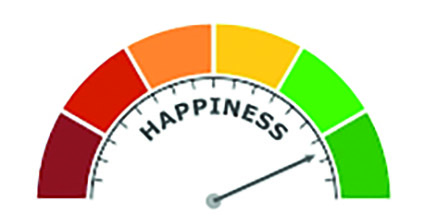 Psychologist Mehezabin Dordi practices at the Sir H N Reliance Foundation Hospital, where she assesses, formulates and implements comprehensive therapeutic interventions for patients with psychological / psychiatric problems, and others.
Psychologist Mehezabin Dordi practices at the Sir H N Reliance Foundation Hospital, where she assesses, formulates and implements comprehensive therapeutic interventions for patients with psychological / psychiatric problems, and others.
Everyone seeks happiness but each one of us defines it differently – in terms of what it is that gives us joy, satisfaction, contentment, and fulfilment. Happiness is a complex and multifaceted state that can be cultivated through intentional actions and mind-set shifts. Let’s jump start the New Year with a 30-day Happiness Challenge which will explore and integrate these practices into our daily lives and help enhance your well-being:
WEEK 1: LAYING FOUNDATIONS OF HAPPINESS
Day 1: Gratitude Journal – Start your challenge by keeping a gratitude journal,each day, note three things you are grateful for. This practice shifts your focus from what you lack to what you have, fostering a positive outlook.
Day 2: Random Acts of Kindness – This could include simply complimenting a stranger or helping a friend/relative. Such acts benefit others and increase your own happiness!
Day 3: Mindfulness Meditation – For 10 minutes, each day, focus on your breath and observe your thoughts without judgment. This reduces stress and improves emotional regulation.
Day 4: Physical Activity – Engage in at least 30 minutes of daily physical activity. Exercise is a natural mood lifter.
Day 5: Connect With Loved Ones – Reach out to friends /family members you haven’t spoken to in a while. Connecting fosters emotional support and sense of belonging.
Day 6: Digital Detox – Take a break from digital devices for a few hours. This helps recharge and engage more mindfully.
Day 7: Self-Care Day – Dedicate a day to self-care activities to nourish your mind, body and soul. This nurtures mental health.
WEEK 2: CULTIVATING POSITIVE MINDSETS
Day 8: Practice Self-Compassion – Treat yourself with kindness and understanding. Self-compassion involves understanding and embracing your imperfections.
Day 9: Visualize Your Best Self – Spend a few minutes daily visualizing your best possible self and future. This increases optimism and drives you towards achieving your goals.
Day 10: Set Small Goals – Success in setting and accomplishing small, achievable goals provides a sense of accomplishment and boosts confidence.
Day 11: Reframe Negative Thoughts – Identify negative thoughts and reframe them positively to reduce anxiety and increase positivity.
Day 12: Spend Time in Nature – Spending at least 30 minutes outdoors or in nature – a walk in the park or gardening – reduces stress and enhances the mood.
Day 13: Learn Something New – Engage in activities that stimulate your mind – learn a new language, start a new hobby – to experience a sense of fulfilment.
Day 14: Declutter/Organise Your Space – A tidy environment reduces stress and improves your ability to focus.
WEEK 3: BUILDING STRONGER RELATIONSHIPS
Day 15: Practise Active Listening – Pay full attention to the speaker, acknowledge their feelings, and respond thoughtfully. This enhances relationships and builds deeper connections.
Day 16: Express Appreciation – To people in your life – through a heartfelt note or verbal acknowledgment. Expressing gratitude fosters positive emotions.
Day 17: Plan A Social Activity – Social activities with friends or family foster happiness, providing opportunities for connecting and shared experiences.
Day 18: Forgiveness – Reflect on someone who has wronged you and practice forgiveness for mental peace. Holding onto grudges leads to negative emotions.
Day 19: Share Happiness – Share a positive story or a happy experience with others. This amplifies your own happiness, spreading positivity.
Day 20: Volunteer – For a cause close to your heart. It fosters a sense of purpose and connectivity with your community.
Day 21: Build Empathy – Engage in activities that help you understand others’ perspectives, like reading biographies, watching documentaries, or having deep conversations. This strengthens social bonds and increases emotional intelligence.
WEEK 4: SUSTAINING LONG-TERM HAPPINESS
Day 22: Reflect On Progress – To evaluate changes you’ve made over the past weeks. Acknowledge your efforts and its positive impacts.
Day 23: Practice Patience – With others, with situations, and with yourself. This reduces stress and frustration, leading to a calmer mindset.
Day 24: Identify Values – Reflect on your core values and align your actions on these for greater life satisfaction.
Day 25: Make Future Plans – Planning your future goals gives a sense of direction and purpose, enhancing motivation.
Day 26: Practice Generosity – Whether through donations, helping others, or giving your time. Generosity boosts a sense of connection and purpose.
Day 27: Cultivate Optimism – Focus on looking for positive aspects in situations and expecting good things to happen. Optimism promotes mental and physical health.
Day 28: Engage in Play – Incorporate play and fun into your routine – playing a game, engaging in a creative activity, or simply being silly, playfulness enhances joy and reduces stress.
Day 29: Develop a Growth Mindset – View challenges as opportunities for learning and growth. This encourages resilience, helps taking on life’s challenges.
Day 30: Establish A Daily Happiness Ritual – that incorporates practices that resonated most with you during this challenge. This could be a morning gratitude practice, an evening meditation, or a weekly social activity.
A 30-day happiness challenge is a structured way to explore and adopt various practices that promote well-being. By integrating these evidence-based strategies into your daily life, you can enhance your mental health, build resilience, and foster lasting happiness. Remember, the key to sustaining happiness is to continue practicing these habits beyond the 30 days, making them a permanent part of your lifestyle.
- Beating The ‘Cascade Effect’ In 2025 - 28 December2024
- How Body Posture Shapes Mental Health - 9 November2024
- Navigating The Boundaries Of Love - 12 October2024
